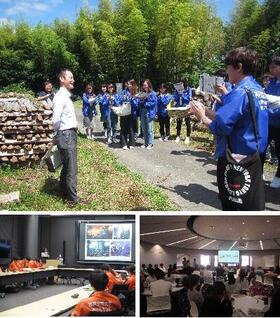- HOME
- Faculties and Graduate School
- The Faculty of Contemporary Social Studies
The Faculty of Contemporary Social Studies
- Department of Contemporary Social Studies (2025 enrollment limit: 130 students): Established in 2014
- Department of Social Studies of Disaster Management (2025 enrollment limit: 90 students): Established in 2014
This Faculty focuses on the problem-solving type of active learning where students learn from and about the community, starting in Kobe, which is known for being an international city and is using progressive approaches to disaster prevention. The students aim to learn how to understand problems from various angles, analyze them scientifically, and search for practical solutions.
Gain a Multifaceted and Comprehensive Understanding of the Complex Problems of Modern Society,and Develop the Ability to Solve These Problems

Studies Based on “Kobe” as an International DisasterPrevention City, to Gain a Global Perspective
“Active Learning” for Problem Solving byLearning from Local Communities
Department of Contemporary Social Studies
The main pillars of the study are the three sectors of “citizens and livelihoods,” “work and industry”, and “regions and culture.” With sociology as a base, students will also study areas such as economics, politics, and public administration to acquire the wide-ranging special knowledge that is necessary to understand modern society whilst also nurturing the ability to think flexibly from multiple perspectives. Seminars and practical learning are used to nurture analytical and problem-solving capabilities.
Qualifications available: Social Researcher*1, First Class Junior High School Teacher’s License (Social Studies)*1, First Class High School Teacher’s License (Civics) *1
Department of Social Studies of Disaster Management
residentsThe main pillars of the study are the two sectors of “disaster prevention, citizens, and the administration” and “disaster prevention, social contribution, and international cooperation.” We aim to use the knowledge and experiences gained in the Great Hanshin-Awaji Earthquake to realize a safe way of living for the future. Students will learn about the basic ways of thinking about disaster prevention and disaster mitigation, understand the current situation, and develop their ability to solve problems. They will also learn about volunteering and international cooperation.
Qualifications available: Disaster Prevention Expert*2, Fire Prevention Manager*2, Disaster Prevention Manager*2, Social Service Activities Support Specialist*2, First Class Junior High School Teacher’s License (Social Studies)*1, First Class High School Teacher’s License (Civics)*1
*1. These are qualifications that can be obtained by acquiring credits in the subjects specified.
*2. This is a qualification that can be obtained by acquiring credits in the relevant subjects and passing a certification examination. Students cannot acquire qualification to take the Emergency Life-saving Technician national certification examination.
【Close-Up】
Active learning that prioritizes practice
Topics 01
Learning together with fellow students
The main part of the study at the University is seminars. With the support from their teaching staff, students draft a plan and conduct investigations by themselves and then give presentations and hold discussions to broaden their thinking and further deepen their research.
Topics 02
Learning from the local region
As part of their active learning, students visit various regions and disaster-stricken areas both within and outside Hyogo Prefecture..They gain an understanding of community issues and people’s lives through interactions with the local residents.
Topics 03
Implementation of citizen life-saver lectures
Students with a first aid instructor qualification give civil life-savers lectures (Ordinary lifesaving course I) to local residents and students at schools in Kobe.
- Faculties and Graduate School
-
- The Faculty of Law
- The Faculty of Economics
- The Faculty of Business Administration
- The Faculty of Humanities and Sciences
- The Faculty of Psychology
- The Faculty of Contemporary Social Studies
- The Faculty of Global Communication
- The Faculty of Rehabilitation
- The Faculty of Nutrition
- The Faculty of Pharmaceutical Sciences
- The Graduate Schools

